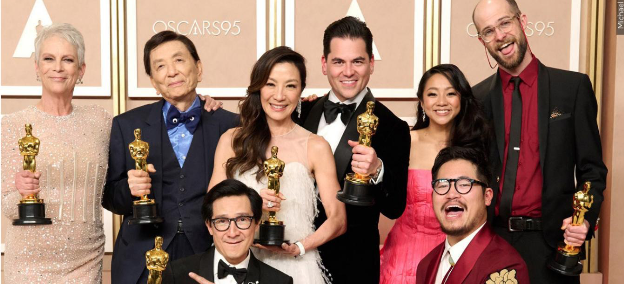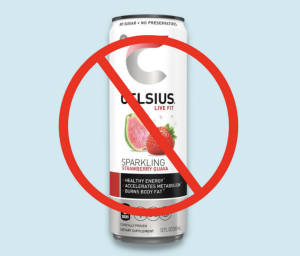Breaking Down the Oscars Dominance
How did “Everything Everywhere All At Once” manage to win Best Picture?
April 5, 2023
As predicted by many critics and awards pundits, Daniel Kwan and Daniel Scheinert’s “Everything Everywhere All at Once” won Best Picture.
The night’s highest honor was nothing more than the film’s victory lap, though. It absolutely dominated the ceremony, taking home Best Actress, Best Supporting Actor, Best Supporting Actress, Best Director, Best Original Screenplay and Best Film Editing — and winning in seven of the 10 categories in which it was nominated. The film garnered a total of 11 nominations, but two were for Best Supporting Actress; Jamie Lee Curtis, who won, and Stephanie Hsu were both nominated.
Yet, despite its stellar awards-season performance, “Everything Everywhere All at Once” is not a typical Best Picture winner by any stretch of the imagination. Equal parts psychedelic and zany, the family drama is a far cry from the stuffy, down-the-middle period pieces the Academy has a soft spot for.
But the Academy of today is not the Academy of decades past, the result of a years-long effort to — finally — diversify and update the organization’s identity.
In 2012, “The Los Angeles Times” conducted a survey of the organization’s membership, finding the average member of the awards body was a 63-year-old white man.
In 2015, activist April Reign started the hashtag #OscarsSoWhite, as none of the year’s 20 nominated actors were people of color, calling on the Academy to recognize the work of non-white performers and filmmakers.
Soon thereafter, the organization began expanding its membership, not only in terms of race, but also age and nationality.
Two years after Reign’s comments, Barry Jenkins’s “Moonlight,” a movie about a young man’s journey with his sexuality, won Best Picture — defeating Damien Chazelle’s rosy-eyed love letter to Hollywood, “La La Land.” The Academy crowned a film about a gay man, directed by a Black man, featuring an all-Black cast, as the movie of the year, rejecting the traditional, down-the-line musical about “movie magic.” Not to say “La La Land” would have been an undeserving winner; both films are exceptionally well-made. But, in a 50-50 race, the awards body’s choice was — when compared to the standard set by past ceremonies — surprising, to say the least.
It seemed to be a watershed moment — until Peter Farrelly’s “Green Book,” a self-congratulatory white savior story, won just 24 months later.
Each of the following three Best Picture winners made history. Bong Joon-ho’s “Parasite,” a tense thriller centered on class division, was the first non-English-language film to win the award; Chloe Zhao’s “Nomadland,” an account of a traveling, working-class woman’s struggles, became just the second female-directed film to receive the show’s highest honor; “CODA,” a chronicle of a young woman’s experiences as the only hearing member of her family, was the first film featuring a predominantly deaf cast to take home the night’s top prize.
Still, all three films are serious dramas; “Everything Everywhere All at Once” is a bright, flashy, blend of action and comedy, two genres the Academy is notorious for neglecting.
It does not add up — because the film’s success can not be traced back to “Moonlight” or “Parasite” or “CODA.” “Everything Everywhere All at Once” was a perfect awards-season storm.
The film premiered at the South by Southwest film festival in March 2022, meaning members of the Academy who were not on board with the film at first had nearly an entire year to give it another chance. Additionally, Michelle Yeoh and Jamie Lee Curtis, who both just won their first Oscars, were at risk of retiring without being recognized by the awards body. Ke Huy Quan’s comeback story — finally landing a big-time gig following his years-long struggle to find work after playing Short Round in “Indiana Jones and the Temple of Doom” — is genuinely inspiring. Stephanie Hsu is an emerging star in Hollywood. Kwan and Scheinert are fresh faces making wholly original content, a hot commodity in an age dominated by intellectual property.
Factor in the film’s universal appeal, a moving story about a dysfunctional family, and you have yourself a true titan of a Best Picture winner.







